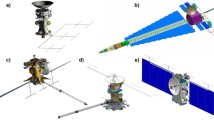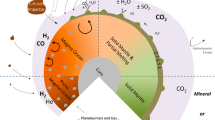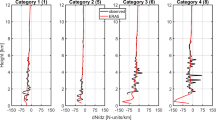Abstract
In the context of space weather forecasting, an automated detection of coronal mass ejections (CMEs) becomes more and more important for efficiently handling a large data flow which is expected from recently-launched and future solar missions. In this paper we validate the detection software package “CACTus” by applying the program to synthetic data from our 3D time-dependent CME simulations instead of observational data. The main strength of this study is that we know in advance what should be detected. We describe the sensitivities and strengths of automated detection, more specific for the CACTus program, resulting in a better understanding of CME detection on one hand and the calibration of the CACTus software on the other hand, suggesting possible improvements of the package. In addition, the simulation is an ideal tool to investigate projection effects on CME velocity measurements.
Similar content being viewed by others
References
Aschwanden, M.J., Wuelser, J.P., Nitta, N.V., Lemen, J.R.: 2009, Solar Phys. 256, 3. doi: 10.1007/s11207-009-9347-4 .
Ballester, P.: 1994, Astron. Astrophys. 286, 1011.
Berghmans, D.: 2002, In: Kuijpers, J. (ed.) Solar Variability: From Core to Outer Frontiers, ESA SP-506, 85.
Berghmans, D., Hochedez, J.F., Defise, J.M., Lecat, J.H., Nicula, B., Slemzin, V., et al.: 2006, Adv. Space Res. 38, 1807. doi: 10.1016/j.asr.2005.03.070 .
Boursier, Y., Lamy, P., Llebaria, A.: 2009, Solar Phys. 256, 131. doi: 10.1007/s11207-009-9358-1 .
Ciaravella, A., Raymond, J.C., Kahler, S.W.: 2006, Astrophys. J. 652, 774. doi: 10.1086/507171 .
Cohen, O., Attrill, G.D.R., Manchester, W.B., Wills-Davey, M.J.: 2009, Astrophys. J. 705, 587. doi: 10.1088/0004-637X/705/1/587 .
Dal Lago, A., Vieira, L.E.A., Echer, E., Gonzalez, W.D., de Gonzalez, A.L.C., Guarnieri, F.L., Schuch, N.J., Schwenn, R.: 2004, Solar Phys. 222, 323. doi: 10.1023/B:SOLA.0000043566.21049.82 .
Domingo, V., Fleck, B., Poland, A.I.: 1995, Solar Phys. 162, 1. doi: 10.1007/BF00733425 .
Evans, C.R., Hawley, J.F.: 1988, Astrophys. J. 332, 659. doi: 10.1086/166684 .
Gibson, S.E., Low, B.C.: 1998, Astrophys. J. 493, 460. doi: 10.1086/305107 .
Gopalswamy, N., Yashiro, S., Liu, Y., Michalek, G., Vourlidas, A., Kaiser, M.L., Howard, R.A.: 2005, J. Geophys. Res. 110, 09. doi: 10.1029/2004JA010958 .
Halain, J., Berghmans, D., Defise, J., Renotte, E., Thibert, T., Mazy, E., et al.: 2010, In: Armand, M., Murray, S.S., Takahashi, T. (eds.) Space Telescopes and Instrumentation 2010: Ultraviolet to Gamma Ray, Proc. SPIE 7732, 77320R. doi: 10.1117/12.857979 .
Howard, R.A., Sheeley, N.R. Jr., Michels, D.J., Koomen, M.J.: 1985, J. Geophys. Res. 90, 8173. doi: 10.1029/JA090iA09p08173 .
Hundhausen, A.J., Burkepile, J.T., St. Cyr, O.C.: 1994, J. Geophys. Res. 99, 6543. doi: 10.1029/93JA03586 .
Jacobs, C., Roussev, I.I., Lugaz, N., Poedts, S.: 2009, Astrophys. J. Lett. 695, 171. doi: 10.1088/0004-637X/695/2/L171 .
Jahne, B.: 1997, Practical Handbook on Image Processing for Scientific Applications. CRC Press, Boca Raton, 483.
Kaiser, M.L., Kucera, T.A., Davila, J.M., St. Cyr, O.C., Guhathakurta, M., Christian, E.: 2008, Space Sci. Rev. 136, 5. doi: 10.1007/s11214-007-9277-0 .
Leroy, J.L., Bommier, V., Sahal-Brechot, S.: 1984, Astron. Astrophys. 131, 33.
Liewer, P.C., Dejong, E.M., Hall, J.R., Pournaghshband, V.J., Thernisien, A., Howard, R.: 2006, AGU Fall Meeting Abstracts, A1472+.
Lugaz, N., Vourlidas, A., Roussev, I.I., Morgan, H.: 2009, Solar Phys. 256, 269. doi: 10.1007/s11207-009-9339-4 .
Lugaz, N., Hernandez-Charpak, J.N., Roussev, I.I., Davis, C.J., Vourlidas, A., Davies, J.A.: 2010, Astrophys. J. 715, 493. doi: 10.1088/0004-637X/715/1/493 .
Manchester, W.B., Gombosi, T.I., Roussev, I., Ridley, A., De Zeeuw, D.L., Sokolov, I.V., Powell, K.G., Tóth, G.: 2004, J. Geophys. Res. 109, 02107. doi: 10.1029/2003JA010150 .
Michałek, G., Gopalswamy, N., Lara, A., Manoharan, P.K.: 2004, Astron. Astrophys. 423, 729. doi: 10.1051/0004-6361:20047184 .
Mierla, M., Inhester, B., Marqué, C., Rodriguez, L., Gissot, S., Zhukov, A.N., Berghmans, D., Davila, J.: 2009, Solar Phys. 259, 123. doi: 10.1007/s11207-009-9416-8 .
Minnaert, M.: 1930, Z. Astrophys. 1, 209.
Poedts, S., Jacobs, C., van der Holst, B., Chané, E., Keppens, R.: 2009, Earth Planets Space 61, 599.
Ponz, J.D., Thompson, R.W., Munoz, J.R.: 1994, Astron. Astrophys. Suppl. Ser. 105, 53.
Robbrecht, E., Berghmans, D.: 2004, Astron. Astrophys. 425, 1097. doi: 10.1051/0004-6361:20041302 .
Robbrecht, E., Berghmans, D., Van der Linden, R.A.M.: 2009, Astrophys. J. 691, 1222. doi: 10.1088/0004-637X/691/2/1222 .
Romashets, E.P., Vandas, M.: 2003, In: Wilson, A. (ed.) Solar Variability as an Input to the Earth’s Environment, ESA SP-535, 535.
St. Cyr, O.C., Plunkett, S.P., Michels, D.J., Paswaters, S.E., Koomen, M.J., Simnett, G.M., et al.: 2000, J. Geophys. Res. 105, 18169. doi: 10.1029/1999JA000381 .
Thernisien, A.F.R., Howard, R.A., Vourlidas, A.: 2006, Astrophys. J. 652, 763. doi: 10.1086/508254 .
Tóth, G.: 1996, Astrophys. Lett. Commun. 34, 245.
Tousey, R.: 1973, In: Rycroft, M.J., Runcorn, S.K. (eds.) Space Research XIII, 713.
Vršnak, B., Sudar, D., Ruždjak, D., Žic, T.: 2007, Astron. Astrophys. 469, 339. doi: 10.1051/0004-6361:20077175 .
Wang, Y.-M., Sheeley, N.R. Jr., Howard, R.A., Kraemer, J.R., Rich, N.B., Andrews, M.D., Brueckner, G.E., et al.: 1997, Astrophys. J. 485, 875. doi: 10.1086/304467 .
Webb, D.F., Mizuno, D.R., Buffington, A., Cooke, M.P., Eyles, C.J., Fry, C.D., et al.: 2006, J. Geophys. Res. 111, 12101. doi: 10.1029/2006JA011655 .
Yashiro, S., Gopalswamy, N., Michalek, G., St. Cyr, O.C., Plunkett, S.P., Rich, N.B., Howard, R.A.: 2004, J. Geophys. Res. 109, 07105. doi: 10.1029/2003JA010282 .
Author information
Authors and Affiliations
Corresponding author
Rights and permissions
About this article
Cite this article
Bonte, K., Jacobs, C., Robbrecht, E. et al. Validation of CME Detection Software (CACTus) by Means of Simulated Data, and Analysis of Projection Effects on CME Velocity Measurements. Sol Phys 270, 253–272 (2011). https://doi.org/10.1007/s11207-011-9740-7
Received:
Accepted:
Published:
Issue Date:
DOI: https://doi.org/10.1007/s11207-011-9740-7




